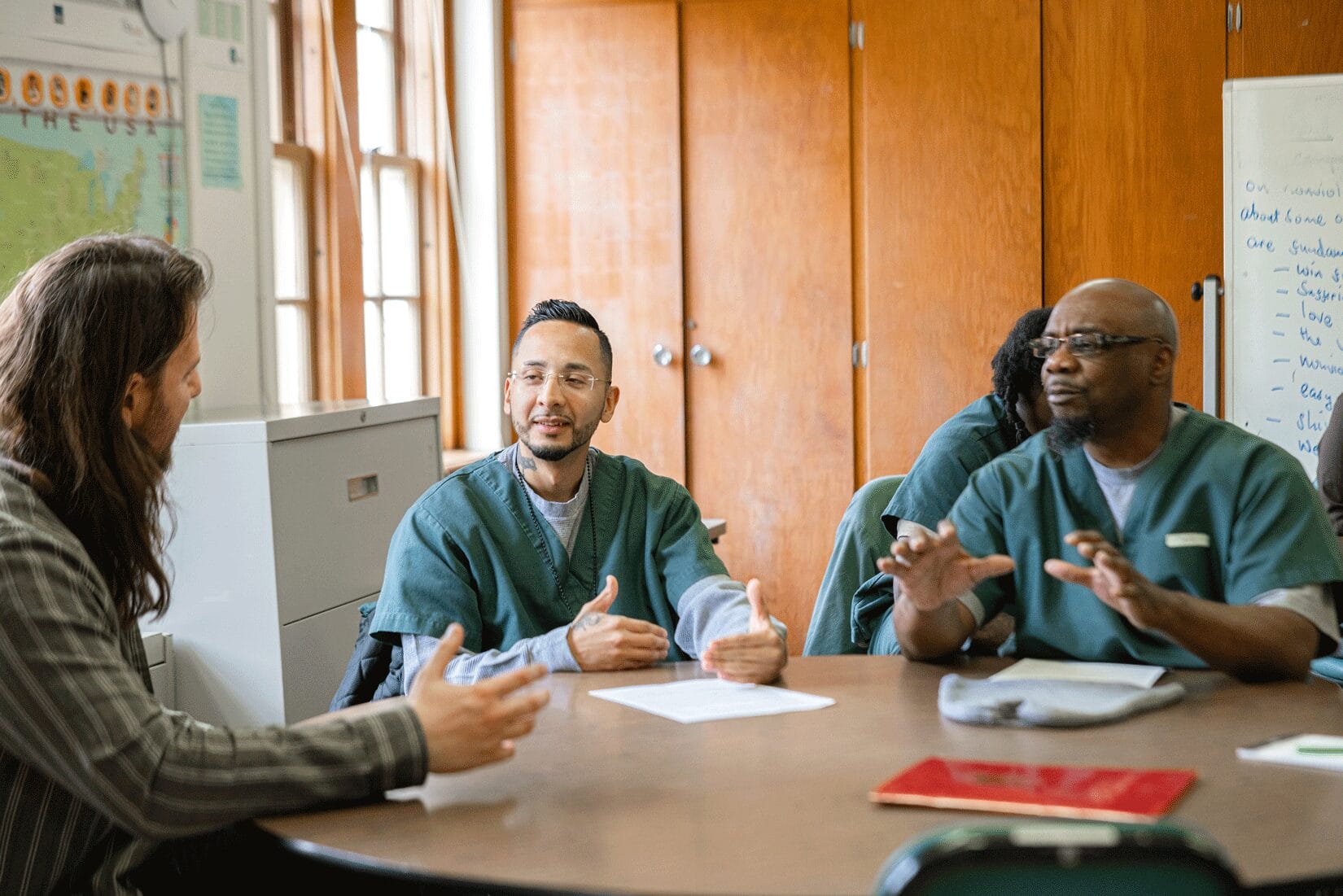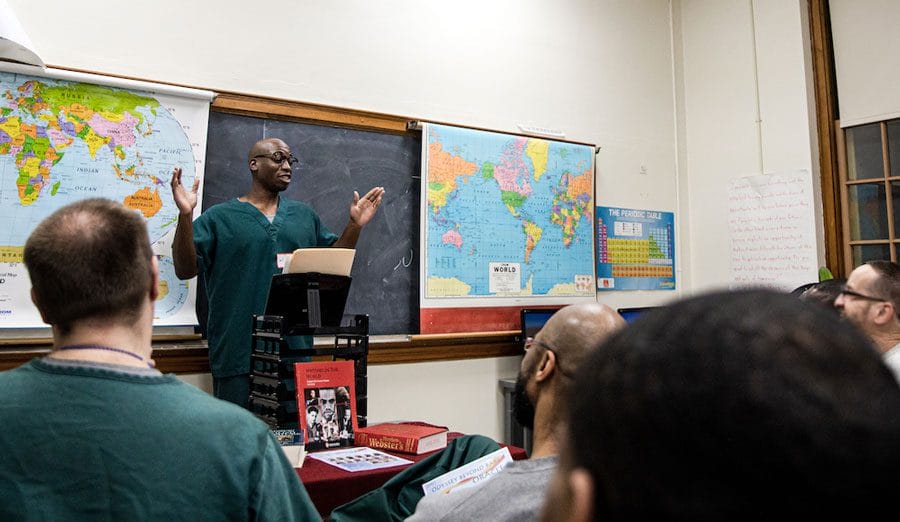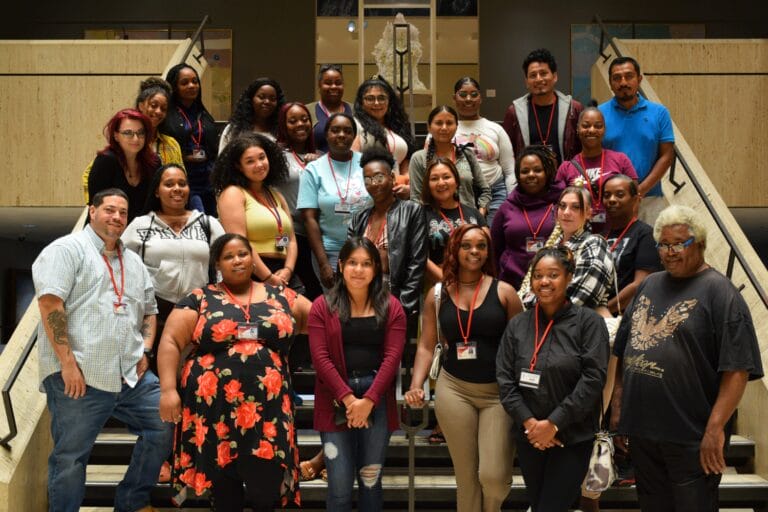
Prison Education Initiative
The UW–Madison Prison Education Initiative (PEI), led by the Division of Continuing Studies and the School of Education, gives learners who are incarcerated in Wisconsin state prisons the opportunity to reframe their futures through higher education.
Students who take college courses while in prison are more likely to be successful when they return to our communities and less likely to return to prison.
What does the Prison Education Initiative do?
The PEI coordinates and supports UW–Madison’s educational programs in Wisconsin state prisons and associated research.
UW degree and certificate programs
The PEI connects efforts across UW–Madison and Universities of Wisconsin to create collaborative UW degree and certificate programs, supported by a Workforce Innovation Grant from the Wisconsin Economic Development Corporation.
College preparation and college jump-start courses
Odyssey Beyond Bars (OBB) has offered English 100 as a college jump-start course to students in Wisconsin prisons since 2019. UW–Madison also offers noncredit enrichment courses through OBB and the Wisconsin Prison Humanities Project, encouraging and preparing students to pursue higher education.
Student and alumni wraparound support
The Prison Education Initiative offers wraparound support to students before, during and after their enrollment in UW–Madison courses. This support includes tutoring and academic and career advising to help students on their individual paths to success.
Research
Researchers in the School of Education and School of Medicine and Public Health, supported by the PEI, are measuring the impacts of prison-based education. The data they collect are helping the Prison Education Initiative expand and improve educational opportunities for our students in prison.
What makes the Prison Education Initiative unique in Wisconsin?
Robust, in-person student support
In addition to in-person instruction, the PEI provides a broad spectrum of academic assistance to students, face-to-face inside the prisons. Supports include tutoring, financial aid and academic advising, one-on-one mentoring, reentry planning to help students prepare for transition back into the community and alumni support after students return home. This robust wraparound support is inspired by the whole-student approach of the UW Odyssey Project, which has helped adult students living in poverty transform their lives through higher education since 2003.
A learning community
The Prison Education Initiative programs surround students with positive peers, advisors and role models. Together, students help each other uncover their potential and transcend negative patterns and influences. The result is a growing body of students who see themselves as productive, healthy citizens with hope for the future.
Research to improve our work
The PEI supports needed and important research on pedagogical approaches and learning outcomes as well as the impacts of college education on the mental health of incarcerated learners. This research will help UW–Madison and other colleges offer more effective programs in the prisons.

Why higher education in prison?
- Almost all people in prison will eventually return to their communities. Participation in prison-based education reduces the risk that a student will commit new crimes and return to prison by about 40 percent, helping to stabilize individuals and families, prevent cycles of crime and create safer communities.
- Prison education increases the odds of employment after people leave prison, contributing to the economy and helping employers fill workforce gaps. PEI programs are built in accordance with employer demand for specific workplace skills.
- Studies show people in prison want educational programs. The PEI provides a supportive, education-focused community to help learners thrive.
- Prison education saves taxpayer money. It costs approximately $40,000 to incarcerate someone for a year in Wisconsin. The RAND Corporation found that every $1 spent on prison education saves $4-5 in reincarceration costs.
- Prison-based education reflects the Wisconsin Idea that the university should address the needs of the state and benefit all Wisconsin residents.
Staff
Peter Moreno
Director, Odyssey Beyond Bars
Bryn Martyna
PEI Operations Director
Adam Mackay
PEI Site Coordinator
Read Prison Education Initiative Stories
 Odyssey Beyond Bars featured on 93.1 JAMZ
Odyssey Beyond Bars featured on 93.1 JAMZ
Krista Uelmen from Krista & The Morning Rush spoke with Kevin Mullen, Assistant Professor & Co-Director of the UW Odyssey Project, and Mark Español, Odyssey Beyond Bars Alumni & DJ.
 Award-winning Odyssey Project development director shares ‘love of humanity’ despite harrowing family history
Award-winning Odyssey Project development director shares ‘love of humanity’ despite harrowing family history
Read about Jenny Pressman’s award-winning work for the UW Odyssey Project as well as her life story that shapes who she is and what she does for her community.
 Odyssey Project receives $1 million match from Pleasant Rowland Foundation
Odyssey Project receives $1 million match from Pleasant Rowland Foundation
The gift to the Odyssey Future Fund will support the UW Odyssey Project’s long-term sustainability and student success for years to come.
 UW Odyssey Project celebrates 20 years of transformation through education
UW Odyssey Project celebrates 20 years of transformation through education
The UW Odyssey Project celebrates 20 years and invites the community to the Chazen Museum of Art for a celebratory event on April 20.
 Odyssey Beyond Bars: Communities benefit from prison education program
Odyssey Beyond Bars: Communities benefit from prison education program
After serving 38 years in prison, Robert Taliaferro returned home in January 2022. As he walked away from Oakhill Correctional Institution in Oregon, Wisconsin, he carried with him more than 175 college credits and a resume that included editing an award-winning prison newspaper.
 UW Odyssey Project launches free education initiative for veterans
UW Odyssey Project launches free education initiative for veterans
In fall 2023, veterans can start a new UW Odyssey Project course tailored to them. Read about the program and learn how to apply now!
Join our mailing list
Sign up to receive news and updates from the Division of Continuing Studies.





